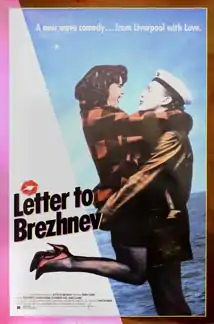Letter to Brezhnev
Letter to Brezhnev is a 1985 British romantic comedy film about working class life in contemporary Liverpool. It was written by Frank Clarke and directed by Chris Bernard. It starred Alexandra Pigg, Margi Clarke, Alfred Molina, Peter Firth and Tracy Marshak-Nash (credited as Tracy Lea). Letter To Brezhnev presents Margaret Thatcher's high-unemployment Liverpool as a depressed and tough city, fallen on hard times.
| Letter to Brezhnev | |
|---|---|
 Promotional movie poster for the film | |
| Directed by | Chris Bernard |
| Produced by | Stephen Woolley Janet Goddard Catherine Spack |
| Written by | Frank Clarke |
| Starring | Alexandra Pigg Margi Clarke Alfred Molina Peter Firth Tracy Lea |
| Music by | Alan Gill |
| Edited by | Lesley Walker |
| Distributed by | Channel Four Films |
Release date |
|
Running time | 94 minutes |
| Country | United Kingdom |
| Language | English |
| Budget | £50,000[1] or £379,000[2] |
| Box office | £450,000 (UK)[1] |
Outline and themes
Two young women from Kirkby, a rough suburb of Liverpool, Teresa and Elaine, meet two Russian sailors, Sergei and Peter, and hook up for a night of fun and frolics. Teresa is looking for sex and a smile, Elaine wants love, romance and the dream of a life far away from the grime of Liverpool.
Amongst other themes, it reflects the constraints on working class women's dreams. It also shows that many people do not get the chance to aspire to anything other than the humdrum lives they find before them as they walk away from school. Some of the characters worked in what they called "the chicken factory", a slaughterhouse.[3] It also reflects hope and ambition as despite awful odds, the protagonists pursue their dreams.
Cast
- Alexandra Pigg - Elaine
- Margi Clarke - Teresa
- Peter Firth - Peter
- Alfred Molina - Sergei
- Tracy Lea - Tracy
- Iggy Navarro - President of Soviet Union
- Ken Campbell - Newspaper reporter
- Angela Clarke - Josie (Elaine's sister)
- Ted Wood - Mick
- Sharon Power - Charlie's Girl
Production
The film was shot in three weeks on a small budget with fees deferred to those involved.[4]
For the soundtrack for the film Sandie Shaw re-recorded the song "Always Something There to Remind Me". Also on the soundtrack was the Bronski Beat song "Hit That Perfect Beat" which was a hit in Australia and the UK. An early scene was filmed in the State Nightclub, a prominent Liverpool venue in the 1980s.
Reception
The film had an international release. The Los Angeles Times critic Kevin Thomas described it as "a winner, [and] further evidence of the enduring renewal of the British film industry".[5] Walter Goodman in The New York Times wrote: "The zesty script by Frank Clarke is at once shamelessly romantic ("You look to the star and think of me") and unromantically streetwise ("Talk about Russian hands and roamin' fingers")."[6] Roger Ebert in his Chicago Sun-Times review concluded: "Letter to Brezhnev is strong because it is simple. It is not really about romance at all. It is about how idealism can be a way of escaping from the rat race. It is about a young woman with the courage to try something dramatic to break out of the trap she's in. It is also about a brave new tradition in British filmmaking, in which the heroes are ordinary people, seen with love".[7]
Kate Muir, writing for The Times in 2017 wrote that the film "creaks a little with age and its crew of young actors sometimes seems stagey. Yet it has ebullient energy".[3] The reviewer for the BFI's Screenonline website described it as having "done more than perhaps any other film before or since in putting Liverpool on the cinematic map". It assisted Liverpool in becoming the second most filmed city in the UK after London.[4]
References
- Borne, Nigel. "Little film little profit." Sunday Times [London, England] 26 Jan. 1986: 31. The Sunday Times Digital Archive. Web. 29 Mar. 2014.
- "Back to the Future: The Fall and Rise of the British Film Industry in the 1980s - An Information Briefing" (PDF). British Film Institute. 2005. p. 25.
- Muir, Kate (28 April 2017). "Classic film of the week: Letter to Brezhnev (1985)". The Times. London. p. 7. ISSN 0140-0460. Retrieved 13 June 2020. (subscription required)
- Roberts, Les (2003–14). "Letter to Brezhnev (1985)". BFI Screenonline. Retrieved 13 June 2020.
- Thomas, Kevin (11 June 1986). "Movie Review: Love Is The Ideology in Brezhnev". Los Angeles Times. Retrieved 13 June 2020.
- Goodman, Walter (2 May 1986). "The Screen: Letter to Brezhnev". The New York Times. Retrieved 13 June 2020.
- Ebert, Roger (11 July 1986). "Letter To Brezhnev". Chicago Sun-Times. Retrieved 13 June 2020 – via rogerebert.com.